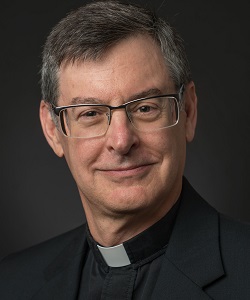
~Fr. Brian Paulson, SJ
On June 5, 2017, the Jesuits’ Chicago-Detroit and Wisconsin Provinces officially joined to become the USA Midwest Province of the Society of Jesus. The unification marked the end of a long but joyful process and the beginning of an exciting journey that will enable the Midwest Jesuits to better serve in ministries throughout the region and the world, spreading the Gospel to more people and in more places.
Father Brian Paulson, SJ, is the first provincial of the USA Midwest Province. Provincial of the former Chicago-Detroit Province since 2014, he shared his vision for the new province in an interview, celebrating the rich history of the Chicago-Detroit and Wisconsin Provinces and embracing the future that lies ahead.
How did the Chicago-Detroit and Wisconsin Provinces come to form a new province, and what has the unification process looked like?
The decision to become one province flowed out of a national planning process completed by 10 USA provincials about eight years ago. They envisioned four large provinces by 2020: East, Midwest, Central-Southern, and West. The main drivers of the decision were a desire to more effectively make apostolic planning decisions and personnel assignments; to better care for our sponsored works which carry the Jesuit name; and to better care for the Jesuits from the novitiate through formation, their years of active ministry, and their senior years. The means to accomplish these goals include a more robust staff of Jesuits and lay people around the provincial.
What is your vision for the USA Midwest Province, and how will you lead your provincial assistants and directors toward that vision?
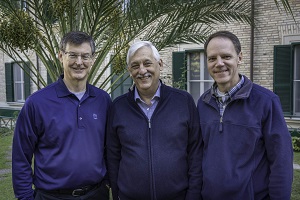
|
|
Fr. Paulson (left) at GC36 with Fr. Arturo Sosa, SJ (center), Superior General of theSociety of Jesus, and Fr. Tom Lawler, SJ (right), provincial of the former Wisconsin Province, which joined with the Chicago-Detroit Province to create the new USA Midwest Province
|
We Jesuits receive our mission from our Superior General — Fr. Arturo Sosa, SJ — in Rome and our General Congregations. The most recent General Congregation 36 (GC36), which took place last fall, described our mission as being “Companions of Jesus in a Mission of Reconciliation and Justice.” Reconciliation includes reconciliation with God, with others, and with creation.
Reconciliation with God means that we need to announce the Good News of the life, death, and resurrection of Jesus Christ to those who will listen, and we need to invite them to believe.Reconciliation with others involves doing what we can to help people promote the common good and social justice at all levels of society, with a special care for those who are poor, struggling, marginalized, and living on the periphery of societies. It also involves global solidarity. We hope to enter into dialogue about Gospel values with people of all faiths and with no faith at all.
|
|
| Fr. Paulson meets Pope Francis at GC36.
|
To pursue this mission, we will continue to be involved in education at all levels and Native American ministry, in addition to sharing our Ignatian spirituality in parishes, retreat houses, social apostolates, through digital and print media on many platforms, and in all our sponsored apostolates. Provincial assistants and directors in each apostolic sector will assist me in planning and caring for these apostolates, always looking for “the signs of the times” so that we can plan accordingly, looking for synergies so that the whole can be greater than the sum of its parts. Lay formation is an essential part of all our works as we continue to grow into the Church of the laity which was envisioned by Vatican II.
One of the most important apostolic tools which St. Ignatius taught us was discernment of spirits — prayerfully figuring out which thoughts and feelings come from God and which come from bad spirits that keep us from choosing the greater good. To do this well, we need to be people of prayer, and ideally, we share our prayer and discernment in dialogue with our brother Jesuits and our lay colleagues in mission.
What is the function of a province?The USA Midwest Province has approximately 530 members. There are about 80 men in formation from novitiate through theology studies in the first 11 years of Jesuit life. During many of these years when they are studying, the formation of a Jesuit costs annually the same as sending a son or daughter to a private Catholic university. This is an enormous investment, for which we need both endowed funds as well as annual fundraising. We have about 110 men in healthcare communities at Colombiere Center in Clarkston, Mich., and St. Camillus Jesuit Community outside of Milwaukee in Wauwatosa, Wis. Once again, the costs for these men are the same as placing a family member in a quality nursing home — an enormous expense for any family. We need your help! We rely on the grace of God as well as annual donors for our senior Jesuits to keep our endowments strong, especially in an age of modest returns on fixed investments.
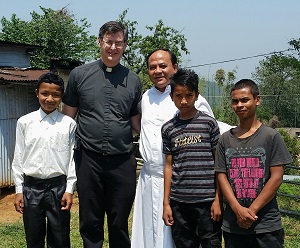
|
|
| Fr. Paulson visits the Kohima Region in Northeast India, one of the Midwest Jesuits' international partnerships. |
Jesuit high schools and universities have alumni which support them. The province does not have “alumni,” so the province needs to invite people who meet the Jesuits in our schools, parishes, and retreat houses to become benefactors of the province as well — people who are able to extend themselves to support the “invisible infrastructure” of the Jesuits. This invisible infrastructure is “behind” everything which bears the name Jesuit. In addition to caring for our men in formation and in senior healthcare communities, we also have significant partnerships with the Eastern Africa Province and with the Kohima Region in Northeast India. This involves assisting them with formation expenses and the costs of province administration in these young regions of the Society of Jesus. We are grateful that many of our donors designate their gifts for the missions, which allows them to be in solidarity with places where the Church is young and growing.
For example, the communications ministry which flows out of the province office is something that only the province can do in the name of the extended Jesuit/Ignatian community in the Midwest, linking us to Jesuit stories and activities both nationally and internationally. An important role of the province is being a hub for communications with other Jesuit provinces around the world which have a reason to send a Jesuit to the Midwest. At any given time, there might be 20 to 30 international Jesuits studying or working in the Midwest. The complexity of obtaining visas, arranging for English as a Second Language classes, and finding appropriate community placements is incredibly labor intensive. Sometimes a province office seems like a mini-consulate, keeping track of all the comings and goings of international Jesuits. This is exciting, and it adds tremendous life to the province. In turn, we are the recipients of similar hospitality as we send Jesuits around the world to study and do ministry.
What would you say about the USA Midwest Province to friends and benefactors who are more familiar with one of the provinces that are now part of the new province?
We want our friends and benefactors to know that we are striving for continuity in mission as we become the Midwest Province. The province office has a team of Jesuits who were originally from both the Wisconsin Province and the Chicago-Detroit Province. Except for our administrative assistants and our “Number Two Man” — our socius/executive assistant — we have shared the entire team of provincial assistants and directors for the past three years. While you might be getting mail and sending donor checks to a new address, you will be supporting the same Jesuit mission you know, love, and believe in.
Our hope in this reorganization of governance is that we will avoid duplication of Jesuits in internal roles in multiple provinces and instead allow them to be “in the world” serving people. We also can combine our resources to employ professional lay colleagues and ministers who can assist us on a province level, sharing their wisdom and expertise across a larger province, always looking for the magis — the greater good that Ignatius urges us to seek.
How will the USA Midwest Province continue to serve at the frontiers into the future?
The Midwest Jesuits are known for innovation and reaching new frontiers. Examples of innovation in the past 20 years include founding four Cristo Rey high schools in the Midwest and three Nativity model schools, all of which serve students from families with limited financial resources; the Ignatian Spirituality Project, which offers retreats to those emerging from addictions and homelessness; the Ignatian Volunteer Corps, which offers women and men over 55 the opportunity to serve people on the margins and personally grow in Ignatian spirituality; our communications ministry, which includes daily reflections and prayers offered through JesuitPrayer.org; the Pope Francis Center, which serves those experiencing homelessness in Detroit; and Arrupe College, the first Jesuit community college, at Loyola University Chicago, which offers an affordable, two-year college degree to students of limited means who will graduate debt-free.
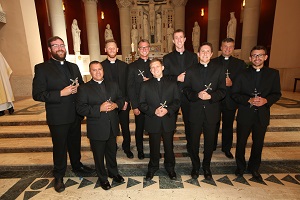
|
|
| The Next Generation: Last August, nine Midwest Jesuit novices pronounced first vows in the Society of Jesus. Several of them contribute to The Jesuit Post and JesuitPrayer.org. |
|
What will change as the USA Midwest Province begins? What will stay the same?
As I mentioned before, there will be continuity of mission with the Chicago-Detroit and Wisconsin Provinces as well as with the mission of the Society of Jesus that has continued since 1540: the Jesuits will do what we have always done, serving where others will not and finding God in all places and bringing God’s love to all people. We will care for our traditional apostolates, and we will continue to read the signs of the times and look for new ways to serve people on the margins and venture to new frontiers.
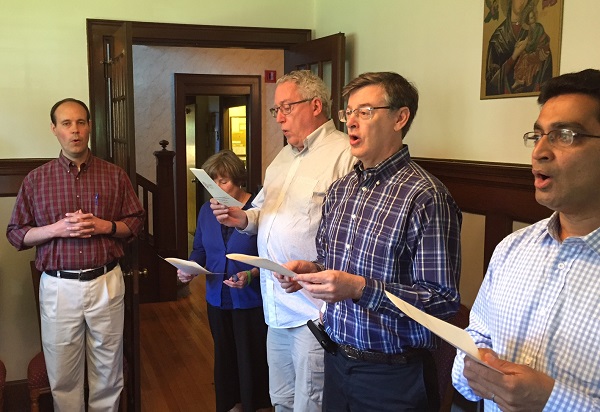 |
|
|
Fr. Paulson is officially installed as provincial of the USA Midwest Province at a service in Milwaukee: (From left) Fr. Mark Carr, SJ, socius of the former Wisconsin Province; Jane Glynn-Nass, healthcare director for the Midwest Jesuits; Fr. Daniel McDonald, SJ, the Midwest Jesuits' provincial assistant for higher education; Fr. Paulson; and Fr. Anand Pereira, SJ, of the Kohima Region Jesuits |
|
Note: This article also appeared in an abbreviated form in the Summer 2017, issue of Jesuits magazine.
Click here for the Summer 2017 Jesuits magazine index